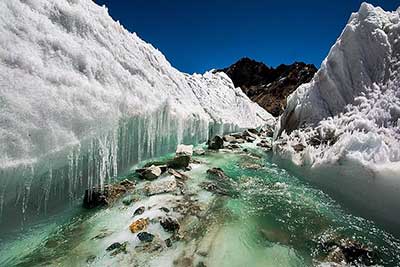Date: 31/03/2023
Relevance: GS-3: Conservation, Environmental Pollution, and Degradation, Environmental Impact Assessment; Disaster and Disaster Management.
Key Phrases: Parliamentary Standing Committee, changing state of glaciers, multilateral or bilateral agreements, sharing glaciological research data, common data-sharing platform, Early Warning System, Multi-hazard Risk Assessment Approach, National Disaster Response Force.
Why in News?
- A Parliamentary Standing Committee suggested that India take up with neighbouring Himalayan nations the issues related to the “changing state of glaciers” and the threats associated with it.
- If required, the country can explore having multilateral or bilateral agreements to share specific data and information on the matter.
Establishment of an Apex Body and National-level Organization
- The panel has pointed out the need for an apex body to monitor the issue of glacier management and a national-level organization to carry out research.
- The Department of Water Resources, River Development & Ganga Rejuvenation (DoWR, RD&GR) has been advised to take the lead role in setting up such an overarching apex body.
Constraints and Recommendations:
- Constraints in sharing glaciological research data:
- The report has identified that there are various constraints in sharing glaciological research data even at the national level, especially high-resolution data.
- This is because specific permission is required from concerned authorities before the use of such data.
- These constraints are hindering the exchange of data by various researchers and stakeholders.
- Need for a common data-sharing platform:
- To address the issue of data-sharing constraints, the department has been asked to take up the matter with the concerned ministries, departments, agencies, and institutes.
- The aim is to establish a common data-sharing platform under the aegis of a single nodal agency.
- Such a platform will enable a seamless exchange of data among various stakeholders and researchers.
- Lack of monitoring of Himalayan glaciers and glacial lakes:
- The report has also highlighted that Himalayan glaciers and glacial lakes are not being monitored or observed on a scale on which they should have been.
- This is primarily due to their remote location and difficulty in accessing them.
- As a result, the Committee has urged upon the Department to make concerted efforts to set up a network of high-altitude meteorological and discharge stations covering more glaciers and watersheds in the Himalayan region.
- This will enable better monitoring and observation of the changing state of glaciers and the threats posed by them.
- Early Warning System:
- The committee recommended the need for a "robust" early warning system, citing a recent increase in incidents of mountainous hazards like glacial lake outburst floods, landslide lake outburst floods, snow avalanches, cloud bursts, and landslides.
- Multi-hazard Risk Assessment Approach:
- The committee has recommended that the Department take initiatives to evolve a multi-hazard risk assessment approach.
- In consultation with other government agencies like NDMA, the Indian Meteorological Department, and respective state governments, particularly the State government of Uttarakhand, the Department should establish a Multi-Hazard Early Warning System coupled with a real-time coordinated mechanism under the aegis of a single nodal agency.
- Strengthening of the NDRF:
- The panel has also suggested the need for strengthening the National Disaster Response Force (NDRF), a specialized rescue and response force, by equipping it with appropriate earth-movers, heavy drilling machines, modern muck-cleaning instruments, and equipment.
- The personnel should have their fleet of aircraft instead of depending on the IAF or State governments to provide choppers for ensuring the timely arrival of rescue teams.
Conclusion
- India has a vast network of glaciers that act as a source of water for its rivers, but the melting of these glaciers poses a significant threat.
- The Parliamentary Standing Committee's recommendations regarding the management of glaciers in the Himalayan region provide a holistic and comprehensive approach to addressing the challenges posed by the changing state of glaciers.
- With concerted efforts, we can ensure the sustainable management of glaciers and mitigate the adverse impacts of climate change.
Source: The Hindu BL
Mains Question:
Q. Discuss the need for a coordinated approach among Himalayan nations for glacier management and the measures that India should take to address the changing state of glaciers and associated threats.







